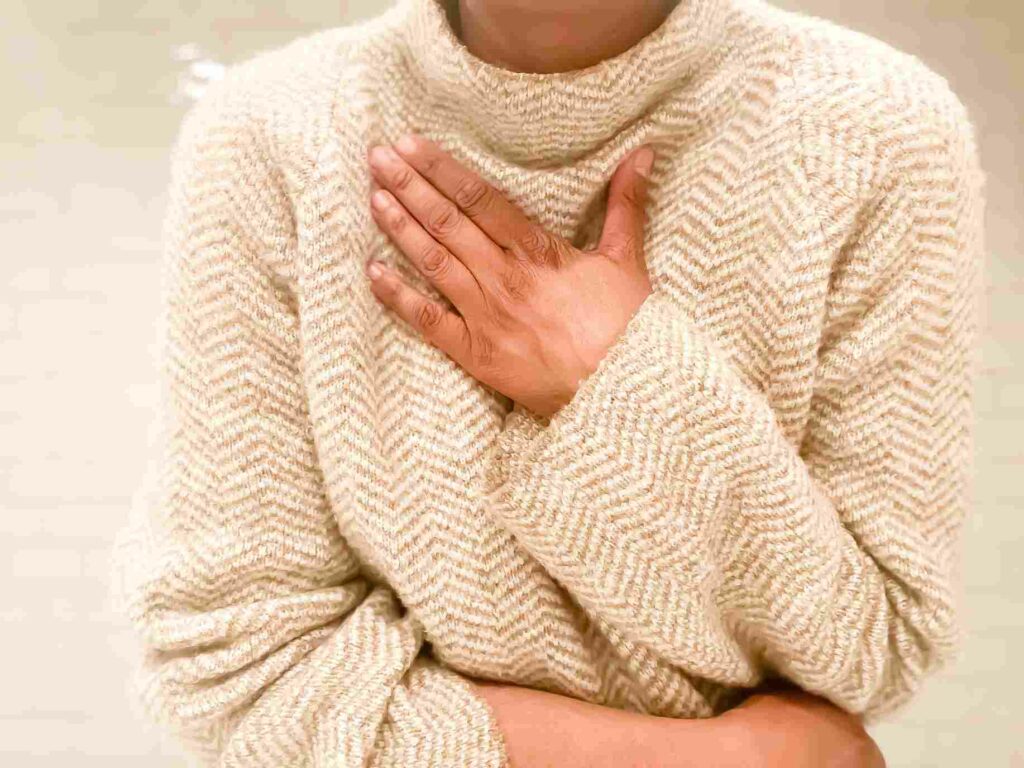Situational anxiety is a form of anxiety that is triggered by certain situations or environments. It can be very debilitating and often interferes with daily life. If you are struggling with situational anxiety, this blog post is for you! In this post, we will discuss the definition of situational anxiety, common symptoms, and treatment options. We will also provide some helpful tips for managing situational anxiety.
Contents
What Is Situational Anxiety?
 Situational anxiety is defined as the fear of a specific situation or object. It is different from a generalized anxiety disorder, which is characterized by chronic and excessive worry about many different things. This type of anxiety can be triggered by a number of different things, such as public speaking, flying, or going on a first date.
Situational anxiety is defined as the fear of a specific situation or object. It is different from a generalized anxiety disorder, which is characterized by chronic and excessive worry about many different things. This type of anxiety can be triggered by a number of different things, such as public speaking, flying, or going on a first date.
It is usually short-lived and goes away once the situation has passed. However, for some people, it can be more persistent and may require treatment. Also, this condition is not specified in the Diagnostic and Statistical Manual of Mental Disorders (DSM-V), which is used to diagnose mental disorders.
Situational anxiety can be treated in a number of different ways. However, it is important to seek help if it is disrupting your life or causing you distress.
What Are The Symptoms Of Situational Anxiety?
The symptoms of situational anxiety can be physical, psychological, or both.
Physical symptoms
Some of the physical symptoms of situational anxiety include:
- rapid heartbeat
- sweating
- trembling or shaking
- shortness of breath
- feelings of choking
- chest pain or discomfort
- nausea or stomachache
- dizziness or lightheadedness
Psychological symptoms
The psychological symptoms of situational anxiety can include:
- sense of impending danger, doom, or disaster
- feelings of being out of control
- irrational or excessive worry
- panic attacks
- phobias
- avoiding situations that are causing anxiety
- obsessive-compulsive disorder (OCD)
- post-traumatic stress disorder (PTSD)
These are just a few of the symptoms that someone with situational anxiety might experience. If you are experiencing any of these symptoms, it is important to seek professional help.
Moreover, it is important to remember that everyone experiences anxiety in different ways. While one person might experience chest pain, another person might experience a headache. It is also important to keep in mind that the symptoms of situational anxiety can be similar to the symptoms of other conditions. So, an accurate diagnosis is necessary.
What Causes Situational Anxiety?
 The causes of situational anxiety can be different for everyone. Some people may experience it in response to a specific event or situation. While others may feel it in certain social situations. It is important to understand what triggers your anxiety so that you can better manage it.
The causes of situational anxiety can be different for everyone. Some people may experience it in response to a specific event or situation. While others may feel it in certain social situations. It is important to understand what triggers your anxiety so that you can better manage it.
There are a variety of things that can trigger situational anxiety. Some common triggers include:
- Public speaking
- Test-taking
- Interviews
- First dates
- Flying
- Meeting new people
Each person experiences anxiety differently and therefore each person will have different triggers. It is important to identify your own personal triggers so that you can better manage your anxiety.
In addition, it is important to understand that not all anxiety is bad. A certain amount of anxiety can actually be helpful in some situations. For example, a little bit of test anxiety may help you study more and do better on the test. However, when anxiety starts to interfere with your daily life, it becomes a problem.
How To Treat?
Situation anxiety is often required professional treatment in some instances. So there are numerous professional treatment options are available. These include:
Psychotherapy
This is a talking therapy that can help you manage your anxiety by teaching you different ways of thinking, behaving, and reacting to situations. It can be delivered either one-to-one with a therapist or in a group setting. It is also known as counseling or talking therapy. These includes:
Cognitive-behavioral therapy (CBT): This is a type of psychotherapy that focuses on helping you change your negative thinking and behavior patterns. It has been shown to be an effective treatment for anxiety disorders.
Exposure therapy: This is a type of CBT that involves gradually exposing yourself to the situations, people, or places that you’re afraid of. This can help you to overcome your fear and anxiety.
The therapy is very useful in treating anxiety. So, you should not delay in seeking the help of a therapist if your anxiety is impacting your daily life. You can try Mantra Care, which is a platform to provide mental health services. With Mantra Care, you can access professional help from the comfort of your home.
Medication
 It is believed to affect serotonin levels in the brain, which can influence mood. There are a few different types of medication that can be used to treat situational anxiety. The most common type of medication is an anti-anxiety medication. This type of medication can help to reduce the symptoms of anxiety. Some examples of this medication are:
It is believed to affect serotonin levels in the brain, which can influence mood. There are a few different types of medication that can be used to treat situational anxiety. The most common type of medication is an anti-anxiety medication. This type of medication can help to reduce the symptoms of anxiety. Some examples of this medication are:
- lorazepam,
- alprazolam, and
- diazepam.
Another type of medication that can be used to treat situational anxiety is:
- antidepressants,
- beta-blockers, and
- SNRIs.
It is important to talk to a doctor about the best type of medication for you. They will be able to prescribe the right medication for your situation. Also, be aware of the possible side effects of the medication. Some common side effects include:
- drowsiness,
- dry mouth,
- nausea, and
- headaches.
If you are experiencing any of these side effects, it is important to talk to your doctor. They may be able to adjust the dosage or change the medication. Remember
How To Cope With Situational Anxiety?
It is essential to be aware of some self-care strategies to help you cope with situational anxiety. The following tips may be useful:
Identify your triggers
This is the first step in learning how to cope with situational anxiety. Once you know what situations or activities trigger your anxiety, you can start to prepare yourself mentally and emotionally for those events. And when you identify, try not to avoid the trigger altogether as this can make the anxiety worse in the long run.
Create your support system
 One of the most important things you can do is to identify who your support system is. This may include friends, family, or a therapist. Once you have identified your support system, make sure to lean on them when you are feeling anxious. Moreover, do not be afraid to ask for help when you need it.
One of the most important things you can do is to identify who your support system is. This may include friends, family, or a therapist. Once you have identified your support system, make sure to lean on them when you are feeling anxious. Moreover, do not be afraid to ask for help when you need it.
Challenge your negative thoughts
In situational anxiety, negative thoughts are often magnified. To challenge your negative thoughts, ask yourself if there is evidence to support them. If not, then try to reframe your thinking. For instance, instead of thinking “I’m going to fail this test,” tell yourself “I will do my best on the test and I am prepared.” With these things in mind, situational anxiety does not have to control your life.
Breathe
When you are feeling anxious, your body goes into fight-or-flight mode. This means that your heart rate and breathing speed up. One of the best things you can do is to focus on your breathing and slow it down. Take deep breaths in through your nose and out through your mouth. Moreover, try to find a quiet place where you can sit or lie down and focus on your breath.
Practice mindfulness
Mindfulness is often used as a tool to help people cope with anxiety. It involves being present at the moment and focusing on your breath. This can help you to ground yourself and be more aware of your surroundings. There are many mindfulness apps and websites that can help you get started. Visualization is often used in conjunction with mindfulness. This involves picturing a calm and relaxing place in your mind. When you are feeling anxious, close your eyes and visualize yourself in this place.
Exercise
Exercise is a great way to release the tension that anxiety can cause in your body. It can also help to improve your mood and increase your energy levels. Even just a few minutes of exercise can make a difference. It studies that exercise is one of the most effective treatments for anxiety. In fact, it can be as effective as medication. Moreover, it has the added benefit of being a natural and healthy way to cope with anxiety.
Get enough sleep
 Sleep is an essential part of daily life and it is especially important when you are dealing with anxiety. When you are sleep-deprived, your body is under more stress and this can make anxiety worse. Make sure to get at least seven to eight hours of sleep every night. Also, understand the importance of sleep during situational anxiety and how it can help you cope.
Sleep is an essential part of daily life and it is especially important when you are dealing with anxiety. When you are sleep-deprived, your body is under more stress and this can make anxiety worse. Make sure to get at least seven to eight hours of sleep every night. Also, understand the importance of sleep during situational anxiety and how it can help you cope.
Reduce your caffeine intake
Caffeine is a stimulant and it can make anxiety worse. More often, people with anxiety are advised to avoid caffeine altogether. However, if you can’t imagine giving up your morning coffee, try to limit your intake to one cup per day. It is also believed that caffeine can interfere with sleep, so it is best to avoid it in the evening.
Stay calm and positive
It is essential to stay calm when you are dealing with anxiety. Although it is difficult to do so, try to take some deep breaths and relax your body. It is also important to keep a positive outlook on the situation. This will help you better manage your anxiety and cope with stressful events. Moreover, do not try to avoid the things that make you anxious. instead, face your fears head-on. And try to understand what is causing your anxiety.
So, these are very effective ways to deal with situational anxiety. Just remember that it is important to stay calm and positive. And do not try to avoid the things that make you anxious. If you do so, you will be able to better manage your anxiety and cope with stressful events.
Conclusion
Conclusively, situational anxiety is a normal and expected reaction to certain life events. While it can be uncomfortable, it is not necessarily harmful. However, if you find that your anxiety is interfering with your ability to live your life the way you want to. It may be time to seek professional help. There are many effective treatments available for anxiety disorders, so don’t hesitate to reach out for help if you’re struggling.
For more information, please contact MantraCare. Anxiety is a common mental health condition characterized by persistent feelings of worry, fear, and apprehension. If you have any queries regarding Online Anxiety Counseling experienced therapists at MantraCare can help: Book a trial Anxiety therapy session


